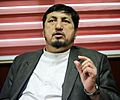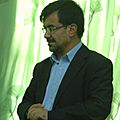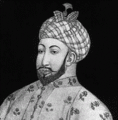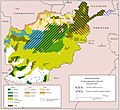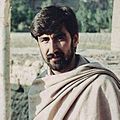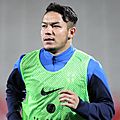Hazara people facts for kids
| Total population | |
|---|---|
| c. 7–8 million | |
| Regions with significant populations | |
| 2,841,000 | |
| 900,000. Some ~ 40,000 Afghan citizens of Hazara descent in Pakistan (2005) | |
| 500,000 | |
| 130,000 | |
| 18,000 (2014) | |
| 4,300 | |
| 3,800 | |
| Languages | |
| Dari (Hazaragi) (eastern varieties of Persian) | |
| Religion | |
| Shia Islam (Twelver and Ismaili), with Sunni minorities (see Aimaq Hazara) | |
| Related ethnic groups | |
| Aimaqs, Tajiks, Uzbeks and Turkmens | |
The Hazara people (Persian: هزاره) are a group who speak a type of Persian. Most Hazaras live in central Afghanistan and in Pakistan. They are mainly Shiite Muslims.
In Afghanistan, the Hazara people are the third largest ethnic group. They make up about 18% to 25% of the country's total population. Over half a million Hazaras also live in neighboring Pakistan, especially in the city of Quetta. Many Hazaras also live in Iran, often as refugees.
Contents
Who are the Hazara people?
The Hazara people have a unique culture and history. They are known for their distinct language, called Hazaragi, which is a dialect of Dari (a form of Persian). Their traditions are rich and include special music, clothing, and celebrations.
Most Hazaras follow the Shia branch of Islam. This is different from most people in Afghanistan and Pakistan, who are mainly Sunni Muslims. This difference in religion has sometimes led to challenges for the Hazara community.
Where Hazaras live
The main home of the Hazara people is a mountainous region in central Afghanistan called Hazarajat. This area is known for its beautiful, rugged landscapes. Many Hazaras also live in other parts of Afghanistan, like the capital city, Kabul.
Outside Afghanistan, large Hazara communities can be found in Pakistan, especially in the city of Quetta. There are also many Hazaras living in Iran, often having moved there for safety or work. Smaller groups of Hazaras live in other countries around the world, including Europe, Australia, and Canada.
Important Hazara figures
Many Hazara individuals have become well-known in different fields. These include politicians, artists, and athletes.
- Abdul Ali Mazari was an important political leader during and after the Soviet war in Afghanistan. He worked to protect the rights of the Hazara people.
- Habiba Sarabi is a famous politician. She was the first female governor in Afghanistan, leading the Bamyan province.
- Rohullah Nikpai is a celebrated athlete. He won Afghanistan's first-ever Olympic medal in Taekwondo.
- Dawood Sarkhosh is a popular Hazara musician. He is known for his songs that often reflect the experiences and culture of the Hazara people.
- Maryam Monsef is an Afghan Canadian politician. She has served as a minister in the Canadian government.
These individuals show the many ways Hazara people contribute to their communities and the world.
Related pages
Images for kids
-
Miniature of Emir Muhammad Khwaja.
-
Abdul Ali Mazari, a Hazara leader during the Soviet war in Afghanistan.
-
The Bamyan Valley, home to the ancient Buddhas of Bamyan.
-
Qazi Muhammad Isa, a key figure in Balochistan.
-
Ethnolinguistic groups in Afghanistan.
-
Muhammad Musa Khan from Quetta, Pakistan.
-
Dawood Sarkhosh is a Hazara cultural musician.
-
A gathering of Hazaras in Daykundi, Afghanistan.
-
Habiba Sarabi and Laura Bush meeting police in Bamyan.
See also
 In Spanish: Hazara para niños
In Spanish: Hazara para niños
 | Chris Smalls |
 | Fred Hampton |
 | Ralph Abernathy |



